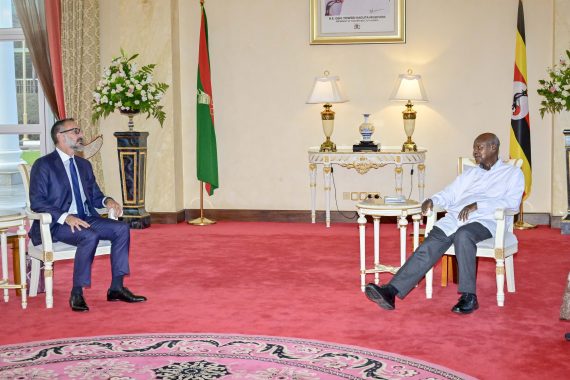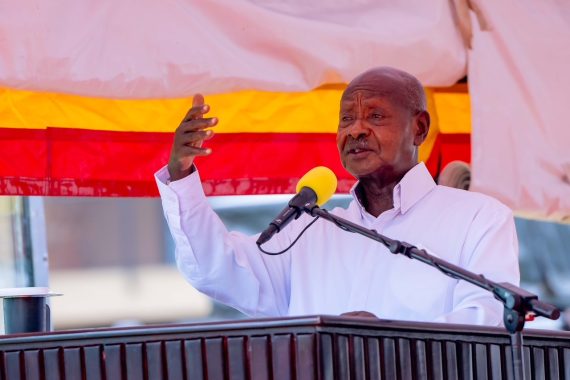Supreme Court Justices order fresh trial in tycoon Ham’s Shs 120 billion case
Five Justices of the Supreme Court have tossed back a case between City tycoon Ham Kigundu and Diamond Trust Bank to the High Court for retrial.
In a stern judgement issued by the justices including Chief Justice Owiny Dollo, Lady Justice Faith Mwondha, Lady Justice Percy Tuhaise, Justice Stephen Musota and Justice Mike Chibita, they contend that the loan granted was legal and the commercial court judgement failed to quote any law forbidding foreign financial institutions from extending credit facilities to any financial institution or person in Uganda.
Kiggundu, through his companies; Ham Enterprises and Kiggs International in 2020 dragged DTB Bank Uganda and Kenya to court for draining Shs34 billion and $23 million from his dollar account.
Kiggundu alleged that between 2011 and 2016 his companies were given loans totaling to Shs41 billion by both DTB Uganda and Kenya and he deposited with them several properties as security but later realized money missing from his accounts.
The top city tycoon had appealed to the Court of Appeal and Supreme court after DTB petitioned against a commercial court ruling in his favour.
On October, 5th, 2020, the head of the Commercial Court Justice Henry Peter Adonyo ordered DTB Uganda to pay back Shs120 billion ‘illegally’ deducted from Kiggundu’s accounts.
Justice Adonyo ruled that the credit facilities offered by DTB-Kenya to Kiggundu were illegal since the bank is not licensed to carry out the financial institution business in Uganda.
However, DTB filed an appeal against the decision before the Court of Appeal, the Principal Judge Dr. Flavian Zeija consequently gave his ruling on 2nd November in favour of DTB, delaying the payment of Shs120bn by Diamond Trust Bank (DTB) to the city businessman.
The bank had lodged an application seeking to have the execution of the Commercial Court stayed.
“This decision has far-reaching implications on the banking industry as far as it declares syndicated loans illegal. This calls for maintenance of the status quo to enable the court of appeal to inquiring into this illegality (syndicated loans) and either uphold the finding or reverse it,” Zeija said in his ruling.
Meanwhile, the Principal Judge described as disgusting the attempt by one of the parties in the matter to bribe him to influence his decision.
Kiggundu challenged the court of appeal judgement before the Supreme Court and a retrial has been directed on some of the grounds below.
“The matter here, for resolution by this Court, is whether the Court of Appeal erred in declining to consider the issue of illegality raised with regard to the foreign lending extended by the Respondents to the Appellants; and yet this was an express ground of appeal. To determine this issue of illegality, it is necessary for this Court to examine the decision of the trial Judge on the matter; and equally examine that of the Court of Appeal regarding the issues it raised of its own volition, owing to the resolution of which it came to the finding that it was unnecessary to consider the issue of illegality raised before that Court.”
“The learned trial judge erred in law in finding that the Financial Institutions Act 2004 applied to the 2nd Appellant in respect of credit facilities issued in Kenya to Ugandan entities. The learned trial judge erred in law and in fact in finding that the 2nd Appellant required approval from the Bank of Uganda to issue credit facilities in Kenya to Ugandan entities.
The learned trial judge erred in law in finding that it is illegal for a foreign bank using ‘money held on deposit’ whether within Uganda and or outside it to engage in activities, such as lending and extending
credit facilities to Ugandan entities without authorization of Bank of Uganda.
The amendment of the plaint, which introduced the claim of illegality as a cause of action, was proper in law.
(ii) The syndicated credit–facility executed between the 2nd Respondent and the 1
st Appellant, with the 1st Respondent as agent of the 2nd 5 Respondent, is lawful; and neither the Financial Institutions Act of 2004, as amended, nor the Financial Institutions (Agent Banking) Regulations, apply to them.
(iii) Accordingly, the claim impugning the legality of the credit– facility contracts between the parties hereto is disallowed.
10 (iv) The issue of illegality having been resolved in this appeal, High Court Civil Suit No. 43 of 2020, between the parties hereto, which was the genesis of the appeal to the Court of Appeal, and ultimately to this Court, is remitted back to the High Court for trial before another judge; basing only on issues of fact
15 arising from the pleadings.
(v) The Respondents are awarded 50% of the costs in this Court, and in the Court of Appeal.
Since the other members of the Coram are in full agreement with the judgment and orders I have proposed above, judgment and orders are 20 accordingly hereby given in the terms set out therein.
Supreme Court Justices order fresh trial in tycoon Ham’s Shs 120 billion case

















